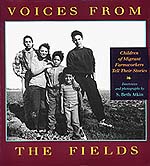Mi Familia
América Reyna, Bonita
Written & translated by,
Teresa Maturino
Written & translated by,
Teresa Maturino
Like my child
I carried you carefully
Like my wet tears
I wiped you softly
Like my fragrant roses
I smelled your spoiled milk
Like my lonely dolls
I caressed you gently
Like my body
I bathed you thoroughly
I was young
You were a baby
Just like me
you carry vivid blood
Just like me
the bold size of our eyes
tanned colored skin
wild ideas
Ay mija,
Reyna, eres más que mi hermana.
(Oh sweet one,
Reyna, you are more than my sister.)
(p. 75)
Reyna, you are more than my sister.)
(p. 75)
This poem shows how deeply one can love especially when you are responsible for the raising of the other. This is a common occurrence among migrant children, the older siblings are left to care for the younger ones while the parents work in the field. Victor believes that his family is strong because they work together. José is in third grade and works in the fields on the weekends, during the summer and sometimes during school to help his family. José knows what hard work is and yet when he grows up, he hopes to pick strawberries. He has pride in what he does because that is what all of his relatives do.
The migrant children, know how hard their parents work to provide for them; their parents know that if their children get an education, they won’t have to work as hard. Obtaining an education is encouraged, but the motivation to learn is the desire to take care of their parents. Manuel hopes to be able to buy his parents a “blue car or a house”. Victor would give his parents all the money he earned and his parents would give him back what he needs to survive.
Children of migrant workers are taught to respect their grandparents as well as their parents by listening to their advice. Mari’s grandmother says “keep on fighting and fighting until we get the best” (p. 88). Mari will be attending Fresno State. When Frank was studying in school his father told him to “put more desire” (Atkin, p. 61). Frank’s grades improved from B’s to A’s. Jesús believes his mother when she tells him “Behave well, you’ll be something good. Behave badly, you won’t be anyone” (Atkin, p. 73). He tries to behave and listen to her advice.
Victor feels that “there isn’t anything more important than (his) family” (Atkin, p. 53). Migrant children have strong family ties because they work together, take care of each other, and respect one another. Their families are the greatest influence on who they will become.
Reference:
Atkin, Beth S. Voices From the Fields: Children of Migrant Farmworkers Tell Their Stories. Toronto, Little, Brown and Company, 1993.

Comments
Post a Comment